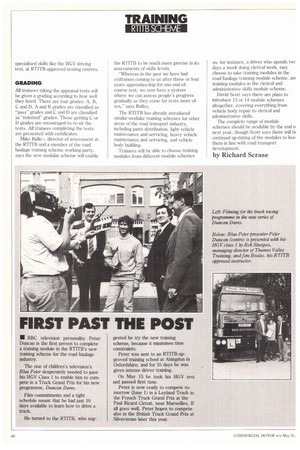A FRESH APP ROAC
Page 79

Page 80

If you've noticed an error in this article please click here to report it so we can fix it.
From the RTITB's kit of training modules operators and their employees will be able to assemble their own training packages Today (May 31) the Road Transport istry Training Board launches a new ling scheme which will change comely the way in which people are led in the road haulage industry. he new scheme has been developed r the past two years by a working :y of union representatives, industry 7esentatives and RTITB members. forking party chairman, the RTITB's id Scott, says the new training me is entirely flexible. It has been igned as a series of training modules, -ently 48 in total, covering almost ry skill involved in the road haulage istry.
here are training modules covering V driving, the handling of hazardous ;roes, sales interviewing and licensing.
TAILORED TO SUIT
"The new scheme enables the employer and the trainee to choose particular training modules to suit the trainee's and the company's needs," says Scott.
Employers who pay a levy to the RTITB should soon receive a complete series of road haulage training modules from their regional RTITB office. They should study the modules to ascertain which are relevant to the company, before discussing with each employee which modules he, or she, should undertake.
Before beginning any of the training the employee will be required to register with the RTITB and complete the road haulage foundation course, which is a general course providing a solid introduction to the road haulage industry.
FLEXIBLE
Under the new scheme the method of training is completely at the discretion of the employer. He, or she, may choose whether to provide training on-the-job, or to send his or her trainees to external training courses.
No time limit is imposed on the training, so the course can be as intense or as gentle as the company and the trainee feel is necessary.
Each training module has a section listing the standards of skill and knowledge that a trainee should attain.
When the trainee has achieved the required skill and knowledge standards, he or she can take the appraisal test, either at one of the four test centres operated by the RTITB, or, in the case of specialised skills like the HGV driving test, at RTITB-approved testing centres.
GRADING All trainees taking the appraisal tests will be ,given a grading according to how well they fared. There are four grades: A, B, C and D. A and B grades are classified as "pass' grades and C and 1) are classified as "referred" grades. Those getting C or D grades are encouraged to re-sit the tests. M trainees completing the tests are presented with certificates.
Mike Ridlei, director of assessment at the RTITB and a member of the road haulage training scheme working party, says the new modular scheme will enable the RTITH to be much more precise in its assessments of skills levels.
"Whereas in the past we have had craftsmen coming to us after three or four years apprenticeship for one end-ofcourse test, we now have a system where we can assess people's progress gradually as they come for tests more often," says Ridley.
The RTITB has already introduced similar modular training schemes for other areas of the road transport industry, including parts distribution, light vehicle maintenance and servicing, heavy vehicle maintenance and servicing, and vehicle body building.
Trainees will be able to choose training modules from different module schemes so, for instance, a driver who spends twc days a week doing clerical work, may choose to take training modules in the road haulage training module scheme, an( training modules in the clerical and administrative skills module scheme.
David Scott says there are plans to introduce 13 or 14 module schemes altogether, covering everything from vehicle body repair to clerical and administrative skills.
The complete range of module schemes should be available by the end o next year, though Scott says there will bq continual up-dating of the modules to kee them in line with road transport development.
by Richard Scrase




















































































